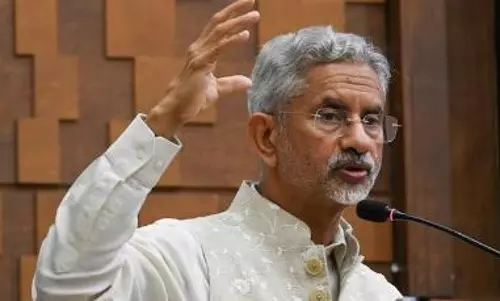
Path to corporate colonialism
text_fieldsThe Union Cabinet has approved a proposal to amend the 2013 Land Acquisition Act to push hundreds of billions of dollars in stalled projects.
The existing ordinance consists of laws that easily enable the corporates to acquire the lands for business purposes driving thousands of people from their homes. The controversial ordinance altering the Right to Fair Compensation and Transparency in the Land Acquisition, Rehabilitation and Resettlement Act, 2013, has already sparked agitations and criticisms. President Pranab Mukherjee had also asked the NDA government to explain the urgency behind the ordinance. The government’s move is viewed as an authoritarian step that will favour the corporate interests and real estate barons. Finance Minister Arun Jaitley had said that the mandatory "consent" clause and Social Impact Assessment (SIA) will not be applicable if the land is acquired for five purposes including national security, defence, rural infrastructure including electrification, industrial corridors and building social infrastructure including PPP where ownership of land continues to be vested with the government.
The land acquisition act of 1894 was created with the purpose of facilitating acquisition of privately held land by the government for public purposes. The land is acquired from the individual land owners by the government for public purposes after paying a government- fixed compensation to the landowners to cover the losses incurred by them from giving away their land. The law is being followed even after six decades of independence. The new amendments are set to be passed without consultation in the parliament. No questions are raised when the government acquires a plot for business purposes citing growth and development of the areas specified giving a minute amount as compensation for the land owners and the environmental impact of such moves are often neglected in most of the cases. There have been intense protests against farmland acquisition earlier, in Nandigram and Singur.
The main objective of the 2013 Bill, which was considered to be ‘unprejudiced’, was fair compensation, thorough resettlement and rehabilitation of the affected people and a complete transparency in the process of land acquisition. Prior consent of 70 percent of the landowners was required while acquiring the land. According to the law, if the land acquired was not used up within five years, it was to be returned to the owners. The corporate bigwigs put pressure to alter the law and the government finally gave in.
The poor landowners ultimately bear the brunt with no land left and no right to question the government. The government owns the forest lands that are handed over for industrial and other business purposes without the consent of the land owners. A new forest legislation was passed in 2006 called the Forest Rights Act or the Tribal Bill that concerns the rights of the tribal people on their land and other resources denied to them over decades as a result of continual of colonial forest laws in the country. According to this law, the lands of these forest dwelling people could be taken only after the consent of the Grama-sabhas. The Supreme Court had also backed the law that was formulated after much study and analysis.
The Modi government is trying to bring about changes to this law entrusting the environment ministry committee headed by TSR Subramanian to review the Indian Forest Act. According to an analysis by NDTV, more than 2.5 lakh acres of land out of more than the five lakh acres acquired for business purposes remain untouched. The rush to make significant changes to a law beneficial to ordinary citizens without even presenting it in parliament is a clear instance of the Modi government pandering to the demands of the bigwigs.

















